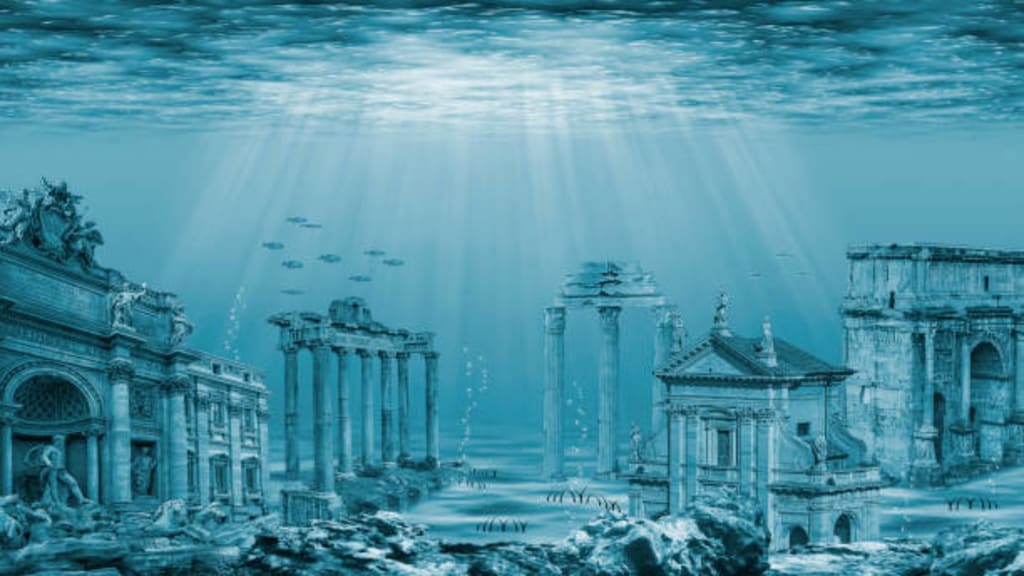
The Lost City of Atlantis has been the subject of countless myths and legends for centuries. According to these tales, Atlantis was an advanced civilization that existed thousands of years ago before it was destroyed in a catastrophic event. While some believe that Atlantis was a real place that has been lost to time, others view it as a mere myth. In this article, we'll explore the mystery of the lost city of Atlantis and examine the evidence for and against its existence.
The Legend of Atlantis
The story of Atlantis is said to have originated with the ancient Greek philosopher Plato. In his dialogues "Timaeus" and "Critias," Plato describes Atlantis as a powerful and prosperous civilization that existed over 9,000 years ago. According to Plato's account, Atlantis was located beyond the "Pillars of Hercules" (now known as the Strait of Gibraltar) and was ruled by a powerful king named Atlas. The people of Atlantis were said to be advanced in technology and culture, and their society was said to be highly organized.
Plato's account describes Atlantis as a city built on a series of concentric rings, with a central island containing a palace and a temple to the god Poseidon. The city was said to be adorned with precious metals and rare stones, and the people of Atlantis were said to have possessed advanced knowledge of agriculture, engineering, and architecture.
The Destruction of Atlantis
According to Plato's account, Atlantis was destroyed in a catastrophic event. He describes how the gods became angry with the people of Atlantis for their pride and hubris, and in response, they sent a series of earthquakes and floods that destroyed the city and plunged it beneath the sea.
While Plato's account of Atlantis has been retold countless times over the centuries, there is no physical evidence to support its existence. Many have speculated that Plato's account was simply a work of fiction or an allegory meant to illustrate his philosophical beliefs.
The Search for Atlantis
Despite the lack of physical evidence, many people have been fascinated by the idea of Atlantis and have searched for evidence of its existence. Over the years, countless expeditions have been launched in search of the lost city, but so far, none have been successful.
One of the most famous expeditions in search of Atlantis was led by the American entrepreneur and adventurer, Robert Ballard, in the 1990s. Ballard is best known for his discovery of the wreck of the Titanic, and he hoped to find evidence of Atlantis using similar technology.
Ballard's expedition focused on an area of the Mediterranean known as the Alboran Sea, which is located off the coast of Spain. Using sonar and other advanced technology, Ballard and his team scanned the sea floor for evidence of ancient ruins. While they did find evidence of an ancient civilization, there was no conclusive proof that it was Atlantis.
Other researchers have focused their attention on a series of underwater structures off the coast of Cuba. These structures were first discovered by the Canadian researcher Pauline Zalitzki in the 1990s, and some have speculated that they could be the remains of Atlantis. However, the structures have not been definitively identified as being of human origin, and the search for Atlantis continues.
Theories about the Existence of Atlantis
There are several theories about the existence of Atlantis. Some believe that Atlantis was a real place that existed thousands of years ago, while others view it as a myth that was created to explain natural phenomena.
One theory is that Atlantis was located on the island of Crete. This theory is based on the idea that Crete was once a powerful civilization that was destroyed by a volcanic eruption and subsequent tsunami. While there is evidence to suggest that Crete was indeed a powerful civilization, there is no conclusive proof that it was Atlantis.
Another theory is that Atlantis was located in the Atlantic Ocean. Some researchers have speculated that Atlantis may have been part of the ancient civilization known as the Minoans, who lived on the island of Santorini in the Aegean Sea. According to this theory, the Minoans were a seafaring people who traded with cultures throughout the Mediterranean and beyond. They may have established colonies on other islands, including Atlantis.
Another theory is that Atlantis was actually a reference to the ancient city of Tartessos, which was located in modern-day Spain. Tartessos was a wealthy and powerful city that flourished from around 1200 BC to 550 BC. Like Atlantis, Tartessos was said to have been destroyed by a catastrophic event, possibly a flood or earthquake.
While these theories provide interesting possibilities, there is no conclusive proof that Atlantis was a real place. The lack of physical evidence, combined with the fact that the story of Atlantis was passed down through oral tradition for centuries before it was written down by Plato, makes it difficult to verify its existence.
The Legacy of Atlantis
Regardless of whether Atlantis was a real place or not, the legend of the lost city has had a lasting impact on popular culture. Over the years, countless books, movies, and TV shows have been inspired by the story of Atlantis, and the city has become a symbol of an advanced and mysterious civilization that was lost to time.
The idea of an ancient civilization possessing advanced knowledge and technology has captivated the imaginations of people around the world. Some have even suggested that the story of Atlantis could provide clues to unlocking the secrets of the universe or the mysteries of the human mind.
In conclusion, the mystery of the lost city of Atlantis continues to fascinate people around the world. While there is no conclusive proof that Atlantis was a real place, the legend of the lost city has left a lasting impact on popular culture and inspired countless expeditions and theories over the years. Whether Atlantis was a myth or a reality, its legacy lives on as a symbol of an advanced and mysterious civilization that was lost to time.
About the Creator
Gokila
She is an astrophile, introvert,
loves to read books all day long,
addicts in healthy lifestyle
and having curiosity to know about new things.
Life Is As Beautiful As You Make It. Contentment Is The Key To Happiness. Peace Be Upon The Saviour.
Enjoyed the story? Support the Creator.
Subscribe for free to receive all their stories in your feed. You could also pledge your support or give them a one-off tip, letting them know you appreciate their work.






Comments
There are no comments for this story
Be the first to respond and start the conversation.